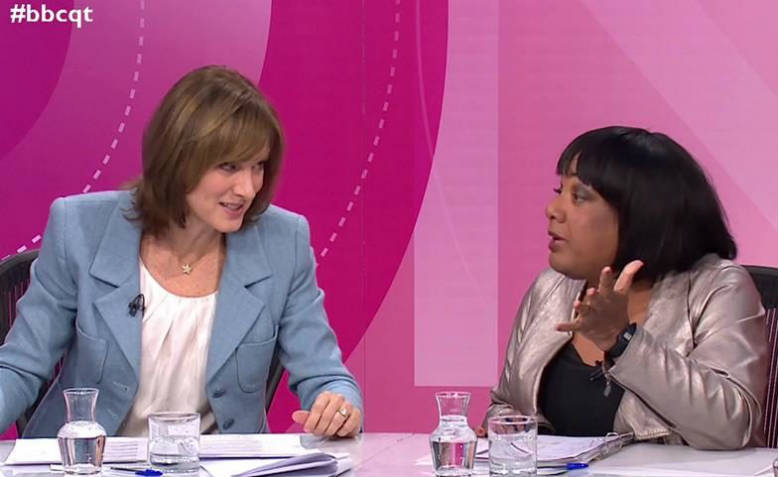 BBC Question Time, 17 January 2019
BBC Question Time, 17 January 2019
The vile treatment of Diane Abbott on the BBC’s Question Time fits a theme of undermining left wing voices and pandering to the right, argues Des Freedman
The BBC’s Question Time is its flagship current affairs programme where members of the public grill politicians on major political issues of the day. It’s supposed to be a sober and impartial forum which respects the views of its participants and gives them all an equal hearing.
So how come Diane Abbott, Labour’s Shadow Home Secretary and one of the few senior black women in politics, was given such a hard time on last week’s episode? Her rebuttal of another panellist’s claim that Labour “was way behind in the polls” was rejected by Fiona Bruce, the new chair of Question Time, who described Abbott as “definitely wrong” – cue much audience laughter.
Bruce was obviously relying only on a single poll – YouGov’s which puts the Tories five points ahead – ignoring three other polls (Survation, ComRes and Kantar) all of which have put Labour ahead in 2019.
As if ignorance of current political data isn’t bad enough, Abbott herself claimed that Bruce interrupted her more than twice as much as Tory MP Rory Stewart and that Bruce had “made unpleasant remarks” about her in the audience warm-up before the programme.
Labour made an official complaint about her treatment and the BBC, while insisting that all participants had been treated equally, nevertheless tweeted that “Diane Abbott was also right that some other polls suggested Labour either as ahead or tied, & we should have made that clear”. While this is a million miles from the apology she deserves, it’s nevertheless pretty obvious that the Corporation has been ruffled by the attention focused on the programme. After all, a video produced by Momentum shortly after the programme headlined “This is scandalous”, has already been seen by1.4 million people, probably more than half of the entire Question Time audience.
Bruce’s attitude is simply the latest example of a media establishment that seeks to diminish, discredit or simply to mock Jeremy Corbyn’s leadership as it becomes clear that he presents a threat to the consensus politics they so passionately defend. As Abbott herself argued, the BBC “needs to stop treating Jeremy Corbyn and his ministers as if we are not legitimate political actors and try giving us the respect they automatically give to Tory ministers and Labour MPs on the right of the spectrum.” The fact that Abbott has appeared on the programme some 30 times makes it all the more astonishing that she was belittled in this way.
Of course, this is hardly the first time that Question Time has had its commitment to impartial and serious political debate questioned. After all, it’s produced by Mentorn Media, one of the largest independent production companies with a strong track record in popular factual output and entertainment with programmes like Robot Wars, Traffic Cops and Who Wants my Council House? Question Time may have its own political agenda but it also wants to make the confrontational and sensationalist TV that it believes will be good for ratings even if this just means ramping up the abuse and the noise.
After all, this was the programme that, back in 2009, rewarded the election of British National Party leader, Nick Griffin to the European Parliament, with an appearance that generated huge controversy and plenty of publicity. Thankfully, a lively protest outside the BBC and widespread condemnation of the invitation squashed any opportunity for the fascist BNP to gain any legitimacy from the episode.
This is the programme that has been fascinated, perhaps more than any other, by Nigel Farage and Ukip more generally. Between May 2010 and March 2017, Ukip appeared on a quarter of all Question Time shows. Farage himself has had the most appearances on the programme since 2000 of any politician (apart from Kenneth Clarke who has also appeared 32 times). This speaks far more to the programme’s desire to pander to right-wing agendas and to secure controversial soundbites and press coverage than to any proportionate reflection of Ukip’s popularity and parliamentary support.
This is the programme whose audience producer, Alison Fuller Pedley, shared posts from Britain First, the fascist group now deregistered as a party by the Electoral Commission, banned from Facebook and the inspiration for the murderer of Jo Cox MP in 2016, and joined the Facebook group, the “British Patriot Front”. That really does show Question Time’s determination to to secure representation from even the most marginal (and hateful) groups.
This is the programme that has had Melanie Phillips on 29 times, Kelvin Mackenzie 13 times, Douglas Murray 11 times, Rod Liddle nine times and even managed to stomach Katie Hopkins twice. Sure there are the occasional voices from the left – Owen Jones has been on six times, Mark Steel four times and Ash Sarkar twice – but they are largely treated as oddities and appendages to the real debate taking place in the centre and their critics on the right.
Maybe we shouldn’t be too worried about a programme like Question Time that feels like a creature from a different century – unable to articulate the real divisions in this country, fascinated by the rhetoric of the right but dismissive of the left, and wedded to a politics of bitterness and spectacle that makes for dramatic if unenlightening viewing.
Or maybe we need to take seriously the constant attempts to undermine radical voices by a political centre that can only agree on one thing: the urgent need to prevent a Jeremy Corbyn government.

